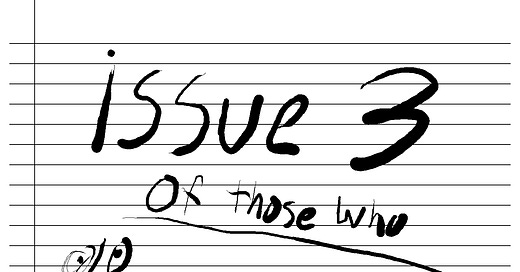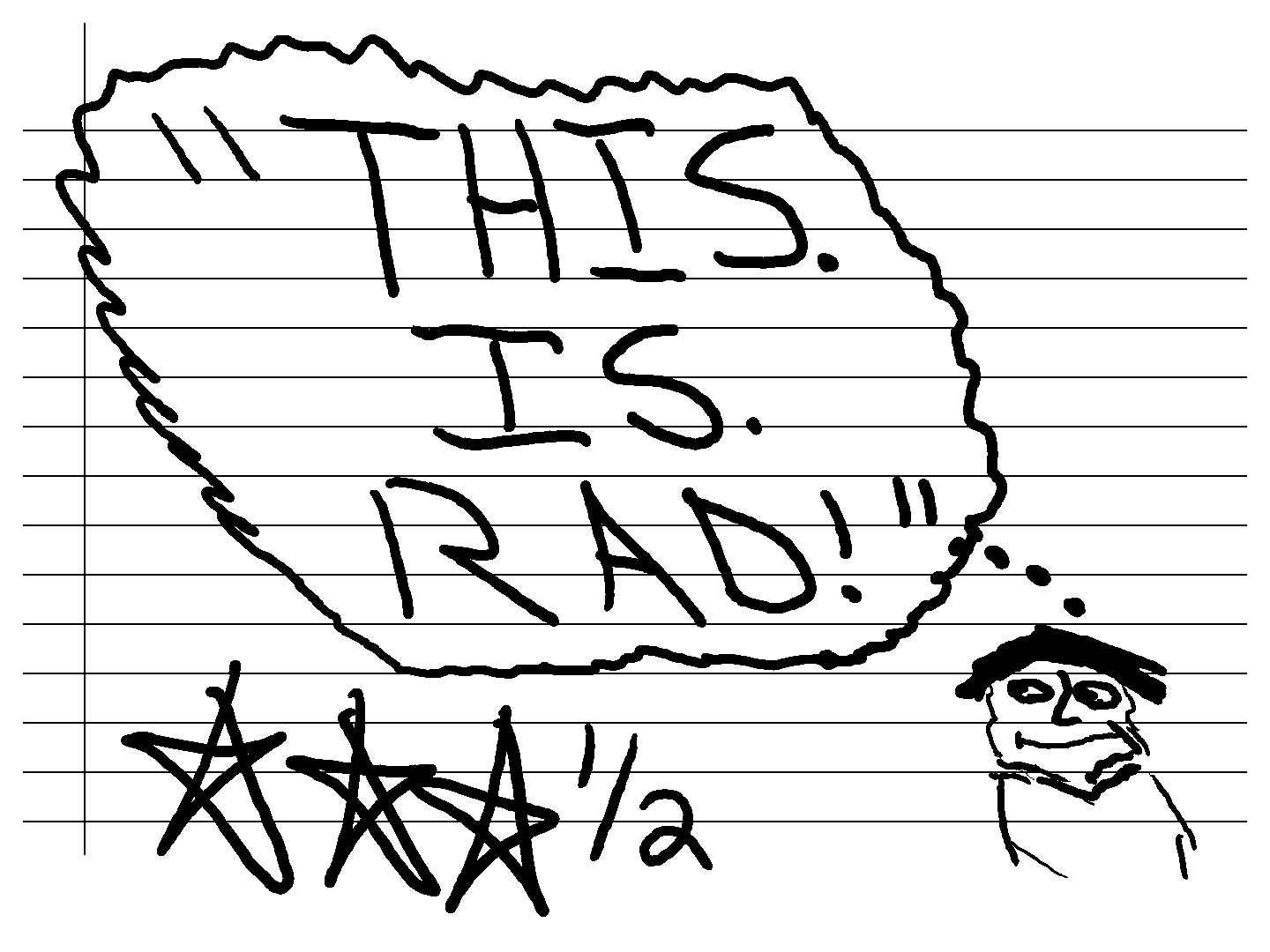Of Those Who is an independent newsletter of film criticism and moviegoing coverage. Please visit the About page for a primer on what this is, share/forward around if you like what you read, and if this has arrived in your inbox by mistake, do click unsubscribe at the bottom of this letter.
Support Your Cinema(s) :)
Are things looking a bit “sketchy” around here?
Indeed, I’ve done things up a bit: Taking direct inspiration from Brandon Ledet’s Swampflix, I’m attempting my version of a digital zine look, by way of a Substack newsletter. With my Mobiscribe device handy, I’ll chicken scratch some doodles for post and article titles, and maybe even include some bonus movie notes too. Dig it?
I’m also updating the format from three separate columns to an overall theme for each issue, with movie reviews and moviegoing being the top - or sole - themes in mind. Some issues will be spread over a few posts or “parts,” and some will be comment threads.
Feedback is always appreciated, so don’t hesitate to let me know what you think.
Many thanks!
:)
It’s hard for any one American to successfully name a Canadian politician, especially with a century removed from their time in office (the same goes with our own representatives, unfortunately). Thank goodness for being able to lean on Google and Wikipedia, but a movie - even a biopic - need not require much or any textbook reading to be understood. This is most definitely the case with The Twentieth Century, though to label it as a biopic would be too restrictive.
This film is more Giorgio Moroder’s Metropolis by way of a Tron acid trip as delivered by Dr. Caligari. Its genre? That may also be too restrictive.
Twentieth is entirely a madman’s Be Kind Rewind sweded-style nightmare-vision of Canada, both then and maybe even now. “Then” is the late 1800’s, a most tumultuous and anachronistic time, that bends and tears at the fabric of a whole country, either at the will of its historical lead character William Lyon Mackenzie King (played with wonderfully limp-wristed courage by Dan Beirne), or through the collective memory and spirit of all contemporary history. Dare not presume, either going in or coming out, that any hard factoid will be had; truth occurs, only insofar as we’re willing to trust the madman telling this tale. And this truth slashes away with nationalism, propaganda, heartbreak, and giving in to puppetmasters for a shot at false destinies.
It’s a wonder, for sure.
As a feature directorial debut, Matthew Rankin went high and achieved higher. His sets have sharp edges, his world is bizarre yet all too possible (and maybe familiar), and his characters are grounded despite their stylistic surroundings and larger than life personalities. It’s uncertain if Rankin is the madman himself or just his messenger, but the message as written and delivered is one of a cuckolded and repressed past that continues to bleed into a present of cold showers and cockeyes. Canadian manners and stereotypes matter not here. What is most concerning in The Twentieth Century would be the fact that, under the thin ice we all walk on, the only thing underneath is just the reflection of ourselves. Or they and themselves, rather.
Rather? Maybe this is us as we prefer. If not, what would we do to change?
It’s everything. This movie is everything.
(Catch a stream here.)
In the years prior to his passing, Roger Ebert had written some on whether he felt video games could/should be considered as art, taking on the thesis response of “no.” It wasn’t with malice, but the comments from gamers certainly were. In the years since, documentaries like The Power of Glove have released, giving quick rundowns on game tech history and where the industry might be heading. Insert Coin follows this trend most lovingly and truly devoted, both to entertaining and slightly disappointing effect. No matter though, as films like these (and many more) have provided more than enough evidence to the contrary of Ebert’s thoughts - something I can only speculate he’d approve of.
Joshua Tsui’s tracing of Midway Games, from the arcade days to the console wars to its end, is heartening and even enlightening. 90’s kids will appreciate the very detailed behind the scenes look at the making of games like Terminator 2 and Mortal Kombat and NBA Jam, which featured in-motion characters - photographed on VHS - fighting and competing to the buttons and keys of players. Some might be upset to learn of the business strategies embedded in these games, meant to manipulate people to keep playing and keep pumping quarters, but really this isn’t technically any new information, just presented against the backdrop of childhood nostalgia. Of course, that changes the pitch of the gut punch.
Insert Coin’s hero is Eugene Jarvis, the so-called “Godfather of Video Games,” and rightfully so as the documentary present. The man beams and smiled with the enthusiasm of a man much younger and wide-eyed than he should be, and laughs as if cynicism hasn’t hit his life as of yet. The man just wants to create and have fun, whether it’s getting away with putting fountains of blood in publicly available games or insider stories that amuses him to no end. This is where Insert Coin excels, by letting the artists tell their own perspectives of their own experiences that helped shape their own industry and medium.
If the film has any kind of “flaw,” - if movies have flaws at all - it would be in its neutral pacing. Never dull, but sometimes a drag. Tsui is clearly driven by a passion for this story, turning on his camera and letting his subjects be friendly and relaxed enough to share with him and the world at all, but long stretches of time go by with just talking heads and not much else. What Midway accomplished and what ultimately happened to them is all very interesting, but a little music and a little oomph can go a long way in the downer parts. Too bad.
Video stores and coin-operated businesses are sorely missed in the droves of which they previously existed, but it’s always nice to look back and learn more. Insert Coin does this well, as a joyful act of exploration and treasure hunting. Indeed, games are art, most especially the mechanics of which they’re made. Maybe exploding heads and ripped out spines are juvenile, but since when is that a disqualification? And who determines that? Just be more like Eugene Jarvis. Just enjoy as much as you can. Just play.
(Playing now at Alamo On Demand and virtual cinemas)
Watch Mank. It’s terrific!
(Now playing on Netflix and at The Prytania Theatres at Canal Place)
History can and should be bendable, especially for dramatic effect, and as long as it’s done towards a heightened and ecstatic truth. Mank certainly goes for the gold in rewriting Citizen Kane’s birth at the expense of Orson Welles, and while that is truly a silly travesty… it works for the movie. A little, anyway.
The film is of course about the process of and the backstory to screenwriter Herman Mankiewicz writing the script for what would become Citizen Kane, long considered the greatest American film ever made. For any Wellesian fellow out and about, this is a fine note, but Kane isn’t even thought of as Orson’s best by these devotees (watch Chimes at Midnight or The Trial, why don’t ya). With the resurgence of his legacy that has followed from the Netflix (of all places) releases of the previously unfinished The Other Side of the Wind and They’ll Love Me When I’m Dead, plus the run of a new piece called Hopper/Welles, it’s not a total surprise that Kane would be revisited, and by one David Fincher.
Mank doesn’t entirely look or even really feel like what a “Fincher film” traditionally would, at least not on the surface, and maybe that’s just due to the story itself. However, this is absolutely a work of Fincher’s playing with non-fiction fiction, even when it’s at times more The Good German than The Social Network.
It succeeds at reaching for blacklist status through virtue of tearing down the Hollywood house of old, but somewhat falters on unsteady feet when it gets too witty for its own good. Now, this is about a screenwriter, so some writeful grace is extended, but only so far. It’s a lovely-looking, sounding, and performed tale that’s scathing and cross-eyed, pointing up at the Hollywood sign and giving it a light middle-finger.
Anti-capitalist? Sometimes, but really it’s more idealistic for convictions and honesty than straight-up detailed about its politics. Mank is embroiled in a system of stabbing, backstabbing, fakery, riches at the expense of suffering, more suffering, and otherwise good people forced into impossible scenarios. Herman witnesses the whole range, and tires of it to the point of hitting back in one of the best examples of “the pen is mightier than the sword.”
For this, the movie wins a thousand times over.
There’s tension, there’s confrontation, there’s the romance of friendship and naivete well past the years where wisdom sets in, and it’s all so lit with colorful attitudes and engagements. A Best Picture contender in a normal year, certainly.
But poor Orson, shown as a brute opportunist (which he likely was for a time) and nothing more, is ever so hurtful. It may assist the film and that’s good in its own right, but… it’s still not right. A temper tantrum at the end seals the rude deal, and a tail ending war of sore words only leaves a bad taste. Cut that down, and there’d be more agreement over Mank’s greatness.
And it is great. To a point, anyway.
LAGNIAPPE - (Q&A) | Chris Henson, writer & social promoter
1) For you, what makes Hollywood South special?
Obviously, New Orleans (and Louisiana in general) is just so unique and vibrant. People here are passionate about making art and having fun, which gels together to make for a pretty interesting and diverse filmmaking scene. It’s been a few years since the big Hollywood South boom and I think we’ve settled into a nice and more manageable groove (pandemic notwithstanding) of Hollywood interlopers and dedicated locals making movies. A big thing is that strong local presence–of not only filmmakers and skilled crew members, but just people passionate about movies and building a local film community.
2) As a critic, what aspect of a movie would you, more often than not, latch onto in a positive way?
I’m not sure I will ever feel completely comfortable being a critic. It is something I certainly enjoy doing, but often feel a bit self-conscious about. There are a few great movies, there are some bad movies, and then, there are a whole lot of just okay movies in between. What do we have to say about those movies? That’s always the struggle. And that’s why a film’s review often came down to how a movie made me feel. It may seem obvious or broad (and likely it is), but isn’t it the ultimate point of all movies?
I latch onto films that give me something extra or lasting to connect with. Was I still thinking about the movie afterward? Did I feel the urge to discuss it with friends, read more about it, discover what other critics have to say about it? Would I watch it again, how soon, and what new things would I discover?
As a critic, we are asked for our immediate opinion on movies. And while I understand the need for that instantaneous fulfillment and realize it is unavoidable, it always leaves me feeling like my reviews are a little incomplete. It’s like: Here’s what I thought of it today, but if you really want to know what I thought of the movie, ask me again in a couple of months (or even years). I need to start a blog called A Year Later Movie Reviews, maybe then I’ll feel more satisfied.
3) The NOLA Film Events handle has been going strong for many years, promoting local film news and events. Why did you start in, has it filled a void, and will it evolve in the near future?
I started NOLA Film Events as a way to better promote my reviews and articles behind a more general and easily identifiable brand than just myself–and it worked. A lot of what I was writing back then was what the New Orleans Film Society or local theaters like Chalmette Movies and Zeitgeist were showing. Really cool and interesting films that most people hadn’t heard of, much less knew where they were playing locally. I wanted to create a go-to source for local film happenings like that, not what was playing at the multiplex. And while I like to cover everything with a New Orleans or Louisiana connection, including those major Hollywood productions that film here, NOLA Film Events will always focus on those local events, films, and filmmakers that need a little more light shined on them.
As for the future, I’ve always wanted to build it into something bigger, but life always has a way of humbling you a bit. Maybe one day I’ll get my act together.
4) What was it like for you when first being introduced to the regional collective of critics, and what advice would you give writers looking to break in?
Being a “blogger” doesn’t open a lot of doors for you. So I worked my way up by making connections with the people who run local theaters and film orgranizations. They needed the press as much as I needed credibility. I am indebted to people like Ellis at Chalmette Movies and Rene at Zeitgeist, as well as Clint and others at NOFS who invited me to press screenings and introduced me to others in the film community. And once I was a part of their circle, I was able to worm my way into the small collective of local critics at press screenings or local events.
Going to those events and engaging with them in the press line on the red carpet or huddled together after screenings is always enjoyable. We writers and critics are always quiet and reserved, standing a bit off from the crowd. It can be intimidating, but seeing the same people over and over again at these events, discussing movies with them, engaging with and sharing their work online, and most importantly, sharing a love and appreciation of movies–all go a long way in forming that bond.
5) What’s your favorite movie related to Louisiana in some way (shot here, set here, or tied to here in some way), and why?
Oh man, a nearly impossible question to answer. Miller’s Crossing maybe? Although that filmed here, it wasn’t set in Louisiana. So, maybe JFK? Eve’s Bayou? Sex, Lies, and Videotape? Down by Law? I can’t say 12 Years a Slave is my favorite movie, but it is probably the best Louisiana-made film. Interview with a Vampire has always been a guilty pleasure of mine. Can I just say Season 1 of True Detective?









